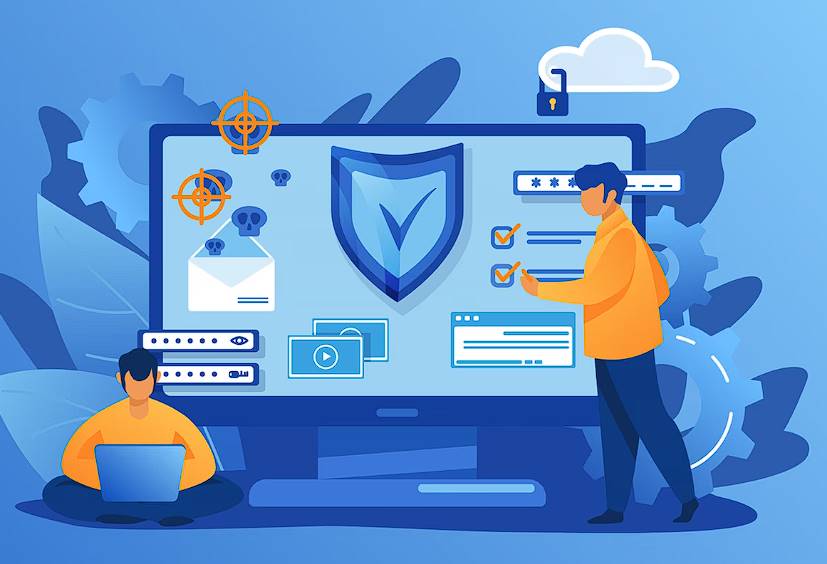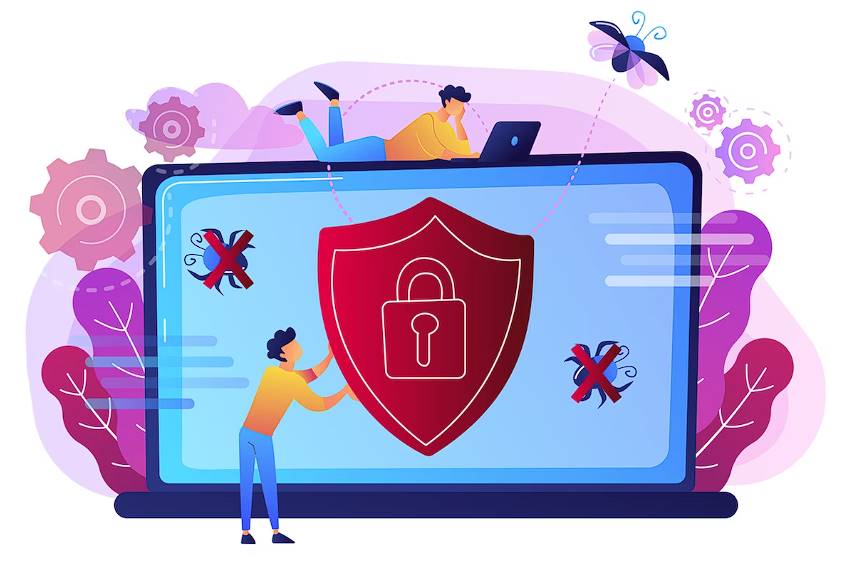Our lives are becoming increasingly linked with the data network as more and more of our routines are shifted online. The digital world is our new frontier, offering chances and possibilities previously imagined, from personal communications to crucial company procedures.
Cyber dangers are a constant and ever-evolving danger that must be considered as we explore the vastness of the digital world. In this information era, nothing is more crucial than the safety of our networks, the castles that guard our data. You've entered a discussion that will go into great detail on network security's impact on the modern world.
While rapid technical progress is exciting, it also creates an environment where enemies of all stripes may take advantage of loopholes for malicious ends. This article will investigate why network security is the sentinel protecting our digital future.
Come along as we investigate the various components of network security and learn why protecting our private data and the fundamental fabric of our contemporary society is vital. Network security is the foundation upon which our whole digital society rests since it protects personal information, safeguards enterprises, and defends against cyberattacks.
The following pages will examine solid network security's benefits, its lack of consequences, and the continuously shifting landscape that needs vigilant surveillance. This blog will help anybody, from technophiles to company owners to those who care about their online reputation, understand why network security is no longer a luxury but a necessity in the modern, data-driven world.
A Definition of Network Security
Network security refers to a collection of technologies that prevent a wide variety of threats from entering and propagating inside a network, protecting the viability and reliability of an organisation's infrastructure.
Tools for protecting the network itself and the apps running on it are part of a comprehensive network security architecture. Effective network security methods employ a multilayered, automated, scalable defence mechanism. Administrator-selected security rules are implemented across many layers of defence.
The need for secure networking for home and corporate networks cannot be overstated. Most homes with high-speed internet have a wireless router or many routers, which can be attacked if not adequately protected. Having a solid network security system may help reduce the likelihood of data loss, theft, and sabotage.
Network security prevents malicious software from infecting your computers. It also ensures the privacy of the information sent. Network security infrastructure provides layered defences against MiM attacks by segmenting data, encrypting it, and sending it via different paths to avoid incidents like eavesdropping.
We can examine how it functions now that we know what network security is.
What Is the Process of Securing a Network?
There are several tiers to consider when assessing a company's network security. Every potential weak point in a network's security architecture must be considered while designing security devices, applications, and policies.
The most frequent forms of network security are physical, technical, and the deployment of controls. An explanation of the various network security regulations and how they work follows.
Administrative Network Security
Protection rules and laws that underpin user behaviour are known as administrative security mechanisms and include things like how users are verified, the level of access they are granted, and the process by which IT administrators make changes to the network.
Physical Network Security
Physical security aims to stop hackers and other malicious actors from physically gaining access to network nodes and infrastructure like routers, switches, and patch panels. Locks, authentication systems, and other access control technologies are vital in any business.
Technical Network Security
Information is only stored on the network or transferred into, within, or out of the network and is safeguarded by technical means. Data and systems need to be protected not only from malicious outsiders but also from dishonest employees.
Advantages of Network Safety
Enhanced Efficiency
When viruses and other assaults damage networks and personal devices, it's next to impossible for employees to do their jobs and keep the business running. Improved firewalls, virus scanning, and automated backups are just a few of the cyber security measures that may drastically reduce the likelihood of a breach and the downtime necessary to rectify it.
Secure Defence Against Outside Attacks
Cyberattacks' motivations are as diverse as their perpetrators, but money is usually at the root of why they're started. Whether they are industrial spies, hacktivists, or cybercriminals, all of these bad actors share three characteristics: speed, intelligence, and stealth.
Reliability and Reputation of Brands
Keeping your current clientele happy is essential to your company's growth. Customers today value good cyber security as the quickest route to winning back their business, earning their recommendation, and increasing ticket sales. Since the strength of a supply chain is proportional to the weakest link, smaller companies have a better chance of being accepted as a vendor by bigger ones.
Safeguarding Against Internal Dangers
The weakest link in cyber security remains human error. Employees, former employees, outside vendors, and even valued partners can all pose a threat from the inside, whether through accident, negligence, or malice. Another factor that can make these dangers harder to spot before it's too late is the fast growth of remote work, personal devices used for corporate purposes, and even IoT devices in faraway places.
Effective Strategies for Network Security
Numerous organisations have lost millions of dollars due to security breaches in their computer networks, which are frequently reported in the news. Your data and infrastructure must be protected. Small and medium-sized businesses (SMEs) that don't have a dedicated IT department may find it challenging to grasp the complexities of network security fully.
Businesses may protect their data and create a more robust defence against hackers and viruses by immediately implementing basic computer network security recommended practices. Here are some tried-and-true strategies for keeping a network safe.
Mastering the Art of Firewall Management
Firewalls serve as a network's first line of defence, setting rules for data traffic to prevent unauthorised access. These digital barriers now incorporate advanced security solutions, utilising multiple techniques and encryption standards to thwart potential breaches.
Embracing Virtual Private Networks (VPNs)
With the surge in remote work, cybercrimes have simultaneously risen. VPNs are pivotal in securing connections between mobile devices and company servers. They restrict network access to approved personnel, making it challenging for cybercriminals to infiltrate your systems.
Promoting Password Hygiene
Frequent password updates that involve a mix of upper and lower case letters, symbols, and numbers can enhance security. Furthermore, in the event of a suspected breach or annually, a password change is essential. Overcomplicating this process can cause confusion; hence, the increasing adoption of two-factor authentication offers an added layer of protection.
Empowering Employees with Knowledge
An organisation's network security is only as strong as its weakest link – often its users. Regular training sessions, highlighting potential threats and preventive measures, can fortify your first line of defence: your employees.
Leveraging Advanced Endpoint Detection
Modern endpoint detection systems harness artificial intelligence to constantly monitor for security anomalies. These tools evaluate data from various sources to identify and swiftly tackle potential threats, providing a robust defence layer against evolving cyber challenges.
Practising Digital Shutdown
Leaving devices powered on overnight can be an open invitation for hackers. A simple act like turning off computers when not required can be an effective deterrent against unsolicited access.
Navigating Email Spam Traps
Phishing emails, cloaked under genuine-looking offers, can mislead even the vigilant. While advanced spam filters reduce such threats, employees should be trained to exercise judgement, especially when emails emanate from familiar sources.
Securing Mobile Access Points
As mobile devices become prevalent in accessing company data, it's crucial to implement stringent policies. Simple measures like disabling Bluetooth, avoiding open Wi-Fi networks, and setting complex passcodes can shield sensitive data.
Implementing Data Encryption
In the unfortunate event of a breach, encryption ensures hackers find only gibberish. Employing encryption tools to safeguard data and recognising secure websites (usually denoted by "https" and a padlock icon) can further solidify your defences.
Collaborating with Experts
Even with stringent measures, the evolving nature of cyber threats can be daunting. Collaborating with technology management firms offers the advantage of constant vigilance and up-to-date defences, ensuring your systems remain impermeable.
In today's digital age, taking proactive steps in cybersecurity is not just an option but a necessity. Embracing these best practices can serve as a foundation for a secure digital landscape.
Conclusion
In today's digital world, network security is important because it saves personal information, keeps businesses safe, and stops cyberattacks. It uses a complete network security design with automated, scalable, and multilayered defences. Effective network security methods use multiple layers of security rules that are chosen by the user.
Secure networking is important for both home and business networks, since most homes with high-speed internet have wifi routers that can be attacked if they are not well protected. Network security stops bad software from attacking computers and keeps the information being sent private. Network security infrastructure has multiple layers of protection against MiM attacks, like eavesdropping, by separating data, encrypting it, and moving it through different paths.
Network security is made up of different layers, including managerial, physical, and technical. Administrative security is based on how users act, and physical security is meant to stop hackers from getting into network nodes and equipment. Technical network security protects information that is kept on the network or sent into or out of the network. This keeps data and systems safe from bad people on the outside and dishonest people on the inside.
Network security has many benefits, such as making the network more efficient, protecting it from threats from the outside, and keeping customers loyal. Small and medium-sized businesses (SMEs) that don't have a specialised IT department need to put in place effective strategies to protect their data and infrastructure. Some strategies are to learn how to manage firewalls, use Virtual Private Networks (VPNs), teach employees how to choose good passwords, use advanced endpoint detection, practise digital shutdown, avoid email spam traps, secure mobile access points, encrypt data, and work with experts.
Firewalls are the first line of defence. They use advanced security solutions and encryption standards to stop hackers from getting in. VPNs only let people who have been given permission into a network. This makes it hard for hackers to get into systems. Frequent changes and two-factor authentication help keep passwords clean. Regular training sessions can help workers learn more and take better precautions. Advanced endpoint detection systems can watch for security problems and offer a strong defence against online threats that are always changing.
To protect private data, it is also important to practise digital shutdown, avoid email spam traps, secure mobile access points, and encrypt data. When you work with technology management firms, you get constant monitoring and the most up-to-date defences. This keeps systems from being broken into. In the digital age we live in now, proactive cybersecurity is important, and if you follow these best practices, you can build a safe digital world.
Content Summary
- The digital world offers unprecedented opportunities and challenges.
- Network security is pivotal in this ever-evolving digital landscape.
- Cyber dangers constantly threaten our digital interactions.
- The safety of our networks is of paramount importance.
- Network security is the keystone of our digital society.
- Rapid technical advancements can create vulnerabilities.
- Vigilance is required to counter ever-shifting cyber threats.
- Network security is indispensable in the modern, data-driven world.
- It employs technologies to guard against diverse threats.
- Effective network security employs multilayered, automated defences.
- Home networks also need robust security measures.
- Malicious software can be mitigated by solid network security.
- MiM attacks are combated by segmenting and encrypting data.
- Comprehensive network security considers every potential vulnerability.
- Administrative security underpins user behaviours and access levels.
- Physical security prevents direct access to crucial network equipment.
- Technical security ensures data integrity both on and off the network.
- Enhanced efficiency results from fortified network security.
- Cyberattacks often have financial motivations.
- A company's reputation is bolstered by stringent cybersecurity measures.
- Network safety aids in customer retention and trust.
- Internal threats, often due to human error, can compromise security.
- The rise of remote work introduces new potential vulnerabilities.
- News frequently reports major losses from network security breaches.
- SMEs without IT departments may struggle to understand network security.
- Immediate implementation of best practices bolsters network defence.
- Firewalls act as initial barriers to unauthorised data traffic.
- Modern firewalls utilise advanced techniques for improved security.
- VPNs are crucial for secure remote connections.
- VPNs make it harder for intruders to infiltrate networks.
- Regular password changes, incorporating diverse characters, enhance security.
- Two-factor authentication provides an extra layer of protection.
- Employee training is essential for recognising and mitigating threats.
- AI-powered endpoint detection systems are a boon for network security.
- These systems swiftly identify and tackle potential threats.
- Turning off idle devices can deter unsolicited access.
- Phishing emails often masquerade as legitimate communications.
- Employee judgement plays a role in recognising malicious emails.
- Mobile devices, given their prevalence, require strict security measures.
- Simple acts like disabling Bluetooth can make mobile devices safer.
- Encryption transforms breached data into unintelligible gibberish.
- Recognising encrypted websites (https) further secures online interactions.
- Collaborating with technology experts ensures updated defences.
- Proactive steps in cybersecurity are not just beneficial but essential.
- The digital age mandates an emphasis on stringent security practices.
- Network security is a blend of technologies, policies, and human actions.
- Cyber dangers, both external and internal, are ever-present.
- Robust network security provides peace of mind in the digital realm.
- Collaborative efforts, combined with education, can fortify digital defences.
- In the modern era, safeguarding one's digital footprint is a collective responsibility.
Frequently Asked Questions
Neglecting network security can lead to data breaches, financial losses, damage to reputation, legal liabilities, and even operational downtime, which can have long-lasting effects on businesses and individuals alike.
Network security safeguards sensitive information from falling into the wrong hands, ensuring that personal and confidential data remains protected from unauthorised access or theft.
Yes, it can. By safeguarding against security incidents, employees can work without the fear of data breaches or interruptions. Additionally, network security tools can automate many security tasks, freeing up time for other important activities.
Network security is essential in remote work environments to protect data accessed and transmitted over the internet. It involves secure connections (VPN), encrypted communications, and the implementation of security protocols on devices used remotely.
Yes, it does. Investing in network security measures can reduce the financial impact of security incidents, which can be substantial. It's a proactive approach that ultimately saves money in the long run.


